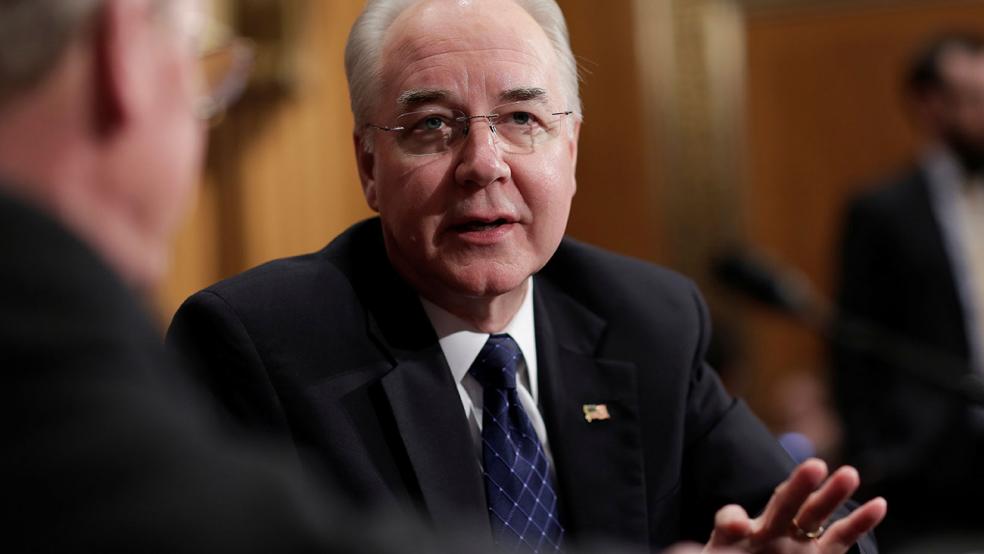Facing new claims that he has not been forthright about his investments in health care stocks while working on legislation that could affect their value, Georgia Rep. Tom Price appeared before the Senate Finance Committee Tuesday in advance of its vote to approve his nomination to be Secretary of Health and Human Services. He also conceded that an administration proposal to turn Medicaid into a “block grant” program could end its status as an entitlement program.
Price had previously been bludgeoned by Democrats over his investments, who have suggested that his behavior, which included sponsoring legislation that would benefit a company whose stock he owned, was unethical. On Monday, a Finance Committee staff report revealed that Price had also been forced to address inconsistencies in his financial disclosures and had failed to disclose that he had once been the subject of an investigation by the Office of Government Ethics.
Related: There’s Less to Trump’s Obamacare Executive Order Than Some Suggest
The senior Democrat on the Panel, Ron Wyden of Oregon, forcefully reiterated a string of investment decisions and reporting failures, and demanded of Price “Yes or no? Doesn’t this show bad judgement?”
“Well, if what you said was true, it might,” Price replied, setting off a back and forth that was interrupted by Committee Chairman Orrin Hatch (R-Utah) who spent much of the hearing acting as Price’s defender.
The nominee later pressed back against claims that he had behaved unethically, saying, “The reality is that everything I did was ethical, above board, legal, and transparent. The reason that you know about these things is because we have made that information available in real time as required by the House Ethics Committee.”
While the questions about his stock trades have caused some discomfort for Price, there doesn’t seem to be much wavering about his nomination in the ranks of Senate Republicans, who would be able to confirm him with a simple majority vote.
Related: The Potential Cost of Obamacare Repeal: 32 Million Without Insurance
Wyden also asked Price to address the executive order issued by President Trump on the day of his inauguration that directed all government agencies to “exercise all authority and discretion available to them to waive, defer, grant exemptions from, or delay the implementation of any provision or requirement of the Act that would impose a fiscal burden on any State or a cost, fee, tax, penalty, or regulatory burden on individuals, families, healthcare providers, health insurers, patients, recipients of healthcare services, purchasers of health insurance, or makers of medical devices, products, or medications.”
The order left many wondering if the new president’s plan was to begin disassembling the Affordable Care Act even before Congress passed a repeal bill.
Wyden, saying that rolling back the law without a replacement would “destroy the market on which millions of working families buy health coverage,” asked Price if he would commit to not acting on the order until a replacement for the ACA had been put in place.
Price declined to do so, saying that what he would commit to “is to keep patients at the center of health care. And what that means to me is making sure every single American has access to affordable health coverage that provides the highest quality health care that the world can provide.”
Related: Could a Hybrid Obamacare Plan Bring the GOP and Dems Together?
Price also dodged Wyden’s attempt to get him to promise that nobody would be “worse off” under whatever replacement plan the administration puts forward. However, in later questioning, he went on to say that no one will lose coverage as a result and to agree to the promise that no one would be “worse off.”
It’s important to note, when Price refers to “affordable health coverage,” that the definition of “insurance coverage” is all important in this discussion. The Congressional Budget Office has warned that some of the more bare-bones plans that opponents of Obamacare would like to see as offered as legitimate options after repeal would have such scant benefits that the agency would not consider them health insurance coverage at all.
In an exchange with New Jersey Sen. Robert Menendez, Price appeared to be at least open to ending the status of Medicaid as an entitlement. Under the current structure of the program, anybody who meets the qualifications for the program is entitled -- has a right -- to receive care under it.
The Trump administration, however, has signaled its intention to turn the program into a block grant, under which each state would be given a fixed sum for the program, creating the possibility that coverage might not be available to all qualified applicants.
Related: Obamacare Repeal Will Test the Definition of ‘Insurance’
Price said he agreed with Menendez that under a block grant, there would not necessarily be a right to coverage under Medicaid. “I think it would be determined by how it was set up, if that was in fact what Congress did. Again, the role of the Department of Health and Human Services is to administer the laws that you pass, not to make the law.”
Menendez urged the nominee not to pretend that, as HHS secretary, he won’t have enormous influence on policy and how it is implemented.





